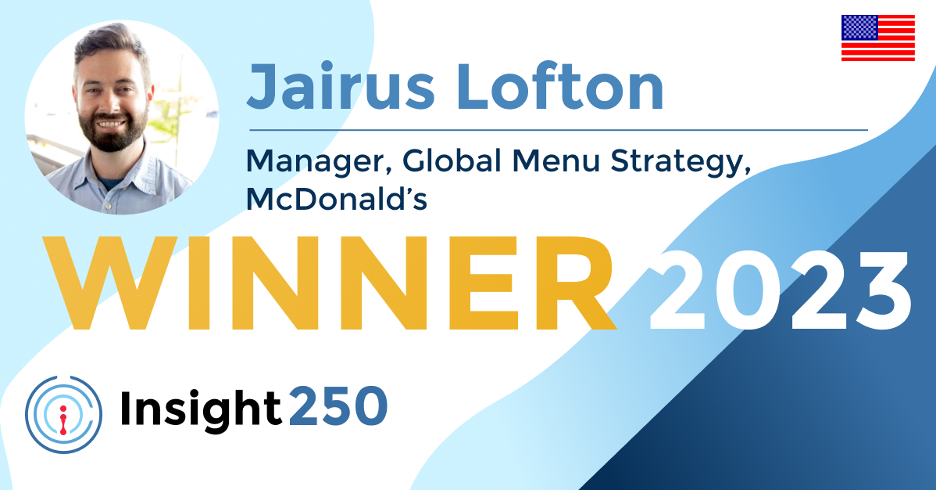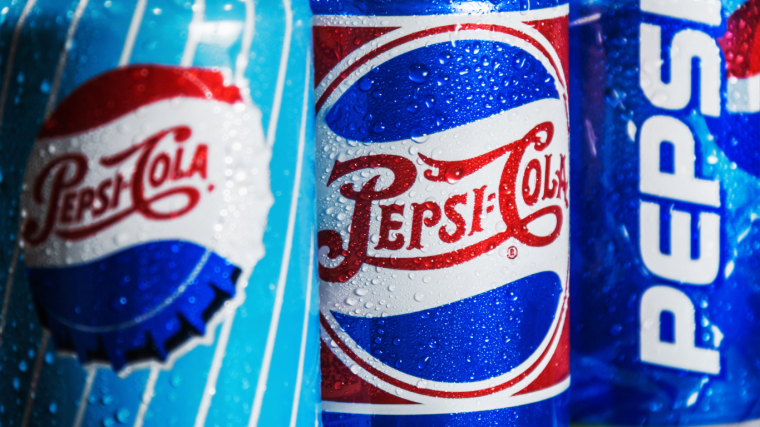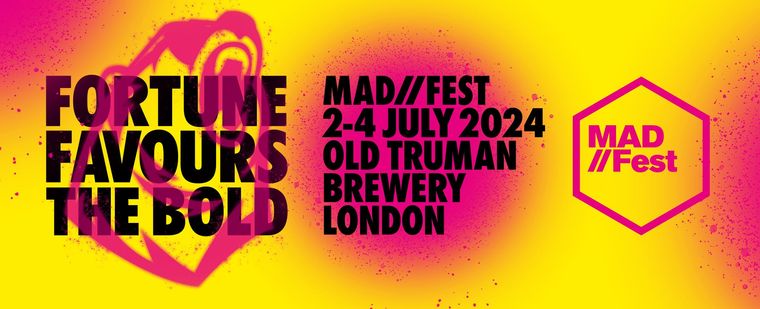Insight innovation and leadership in Quick Service Restaurants (QSR)
Jairus Lofton discusses how insights are driving customer understanding and menu strategies to build affinity and loyalty in order to maintain McDonald's as a market leader.


The Insight250 spotlights and celebrates 250 of the world’s premier leaders and innovators in market research, consumer insights, and data-driven marketing. The inaugural list was revealed in April 2021, and the 2022 winners were announced in Toronto last September at ESOMAR’s Annual Congress. The awards have created renewed excitement across the industry while strengthening the connectivity of the market research community. The 2023 Winners were announced this past July and can be seen at Insight250.com. Also, the inaugural Insight250 Legends will be announced soon.
With so many exceptional professionals named to the Insight250, it seems fitting to tap into their expertise and unique perspectives across various topics. This weekly series does just that: inquiring about the expert perspectives of many of these individuals in a series of short topical features.
This edition features Jairus Lofton, McDonald’s Manager of Global Menu Strategy. I sat with Jairus to understand how research and insights increasingly influence quick-service restaurants (QSRs). His extensive expertise in strategic insights spans not only McDonald’s but also his prior roles with The Hershey Company and Sonic. Jairus discusses how insights are driving customer understanding and menu strategies to build affinity and loyalty in order to maintain McDonald's as a market leader.
The QSR industry has never had more research intelligence available. You can access a spectrum of reports at mTab Marketplace from leading sources like Kantar, Tastewise, Brand Finance, Yelp, and Fatpos. These types of deep industry insights are helping QSR brands understand their customers and develop their strategies like never before.
Crispin: How critical is customer insight for QSR brands in today’s market?
The QSR landscape is more crowded and more competitive than ever before. Large brands are competing for a group of consumers who brand-switch frequently, are increasingly feeling inflationary pressures, and are hyper-aware of all the offerings in the marketplace. Added to all of this is the emergence of strong regional brands. Having a solid customer insight foundation is now table stakes.
“Beyond that, to have a competitive advantage, brands must understand customers on a deeper level – what are their pain points? What needs are they trying to meet? And for McDonald’s, how can we meet those needs in a way that delivers on our unique position in the global QSR landscape? To do that, we have invested in a robust set of foundational studies that help us understand how we perform at a global (macro) scale and market (micro) scale. Beyond our foundational work, we are constantly assessing how we are performing and how our customers view us and the competition, so the customer insights work never stops.”
Jairus Lofton
Crispin: Is using insights to drive commercial decisions increasing or decreasing in the QSR sector, and why do you think that is happening?
Insights-driven decisions are absolutely increasing. We’re seeing that every decision has some kind of basis in insights, mainly because we are beginning to realise that a lot of our decisions have downstream effects on both our crew and our customers. Whenever we encounter a decision point, we first try to understand what insights we already have to help guide us. If we don’t have enough (or recent enough) research, then we will begin to explore what kind of work is needed to help influence this decision. All of this is run through a customer and crew-focused lens to gauge the effect in the restaurant and, ultimately, what is the experience for our customer.”
Jairus Lofton
Crispin: What data types are used to develop insights for QSR brands and products?
We look at a wide swath of data types, but what we use varies depending on our goals. When we are looking at the pipeline for new products, we want to get a lot of customer feedback very quickly on a few KPIs to know which products are worth exploring further. When looking at broad attitudinal views of our brand, we want to have a higher-level, longitudinal view to see large-scale shifts. To understand the attractiveness of a particular category or our growth, we’ll look at syndicated data like Crest. More recently, we are finding that we are gaining a lot of insights from known customer data, especially around trial and repeat visitation for our promotions.”
Jairus Lofton
Crispin: Does a growing and changing customer base influence how QSR brands gather insights?
Absolutely. This is especially true with qualitative work. Younger customers are much more comfortable sharing information about themselves and talking directly to us. We are tapping into that aspect to get a richer understanding of our customer experience. What’s also great about having a customer base that is more open to giving feedback is that we can get a lot of real-time insights. A great example of this is when we are looking at the performance of a particular product or even trying to understand how a change in our operations is affecting customers, and we can ask those customers to go there and, in the moment, let us know what that experience was like. In that way, you get a recent perspective versus a receipt-based survey where time has passed, and the recollection might not be as clear.”
Jairus Lofton
Crispin: How has the profile of the average McDonald’s customer evolved over the last decade, and what factors do you believe are driving these changes?
We’ve seen a broad expansion of our customer base. So much so that we can’t say that we have a typical customer. This can be great, but it also presents some challenges, as it can be more difficult to focus on product design or marketing. This does change somewhat when you zoom in with something like dayparts, but even then, we are finding that across all of our guests, there is a lot of variety.
“Instead of a distinct customer, what we’ve uncovered through research is that our customers have some key commonalities. One of those is the shared experience of our food: what we might call our “fan truths.” You could see this in the McDonald’s US Super Bowl commercial last year that focused on that moment in the drive-thru when you can’t pinpoint what you want because everything looks so good.
“There are a lot of reasons behind this customer shift, but from my perspective, I think that we’ve been able to leverage the connections that people have with the McDonald’s brand. Whether through a nostalgia lens (e.g., I’m sure everyone remembers playing in a McDonald’s Playland as a kid) or through our connections to culture, our marketing has done a great job of making our brand relevant in a very authentic way. It also doesn’t hurt that we serve delicious food!”
Jairus Lofton
Crispin: What role do insights play in attracting new customers and moving them from occasional customers to more frequent customers?
This is a great question. Since our reach is so broad, for McDonald’s, it’s more about getting customers who haven’t visited recently to come back. Insights play a key role in this. If we can understand why they haven’t been in a while (convenience, offerings, etc.), we can hopefully address those reasons. Through insights, we've also discovered that often, re-engaging customers can be as straightforward as reminding them of our beloved iconic products.
“Increased visitation can be trickier, but we find that twists on our well-known flavours are often effective at creating excitement around our offerings. My favourite example of this is the Chicken Big Mac. It’s the Big Mac that you know and love but reimagined with golden fried chicken. Whenever this promotion runs, we see a noticeable uptick in repeat traffic, especially because everyone knows it’s only around for a limited time.”
Jairus Lofton
Crispin: Can you provide an example of a key insight that fundamentally changed a product decision or marketing strategy at McDonald’s? How do you ensure such insights are effectively communicated and implemented across various departments?
A great example of this is our best burger refresh that we’re rolling out now across our global system. We found through our foundational research that customers loved the taste of our burgers, but we weren’t delivering on some key attributes like juiciness or temperature. For us, this was a key unlock. We knew that we had to get the basics right: delivering our iconic products in the best possible way, at the speed and consistency of McDonald’s. This was a whole organisation effort to get this bought in across the system and then deployed, but for us, it started with that one key insight: we need to do a better job delivering on our cornerstone products.
“Insights as a discipline is taken very seriously at McDonald’s, so from that perspective, very lucky that it doesn’t take a lot of convincing to get everyone on board when the answer is clear. That being said, we still need to socialise learning whenever there is likely to be some meaningful investments as a result of those learnings. From my experience, the best way to do this is to lead for the benefit of our crew and customers; if that is apparent, then implementing those recommended changes becomes much easier.”
Jairus Lofton
Hot Topic
Market evolution - how do you see the QSR space evolving?
I believe we will see a lot of exploration in non-traditional formats. We’ve gotten used to seeing QSRs showing up in the same way for a long time. I believe we will have massive shifts in physical implementation and how customers interact with QSRs.”
Jairus Lofton
Top Tip
For insights professionals, my top advice is to ask for feedback on the work you are doing proactively. I especially recommend doing this with cross-functional partners whenever you get a chance. It’s really easy to get siloed in insights, but reaching out with simple questions, like “How could this have been better?” leads to good conversations, and you will be a stronger insight professional as a result"
Jairus Lofton
Crispin: Thanks, Jairus. It is fascinating to see how insights are evolving and playing an ever-increasing role in the QSR space, particularly in building customer loyalty but also in driving product and menu strategies.
 Jairus’ experience spans consumer insight, brand strategy, market segmentation, and strategy. As Manager of McDonald’s Global Menu Strategy, he creates growth and strategic advantages for McDonald's through leveraging and elevating our core items, building roadmaps for innovation, and delivering on the company’s brand promise. Previously held roles with Sonic and The Hershey Company.
Jairus’ experience spans consumer insight, brand strategy, market segmentation, and strategy. As Manager of McDonald’s Global Menu Strategy, he creates growth and strategic advantages for McDonald's through leveraging and elevating our core items, building roadmaps for innovation, and delivering on the company’s brand promise. Previously held roles with Sonic and The Hershey Company.
Crispin Beale
Chairman at QuMind, CEO at Insight250, Senior Strategic Advisor at mTab, CEO at IDXCrispin Beale is a marketing, data and customer experience expert. Crispin spent over a decade on the Executive Management Board of Chime Communications as Group CEO of leading brands such as Opinion Leader, Brand Democracy, Facts International and Watermelon. Prior to this Crispin held senior marketing and insight roles at BT, Royal Mail Group and Dixons. Crispin originally qualified as a chartered accountant and moved into management consultancy with Coopers & Lybrand (PwC). Crispin has been a Board Director (and Chairman) of the MRS for nearly 20 years and UK ESOMAR Representative for c15 years. As well as being CEO of Insight250, Crispin is currently Worldwide CEO of Digital Communications Solution Agency, IDX. Crispin is also the Senior Strategic Advisor at mTab and the Chairman of QuMind and spent 4 years as Group President of Behaviorally where he was responsibile for the client & commercial teams globally. Crispin is a passionate advocate for blending human intelligence and technology to deliver innovation and leadership across organisations.


